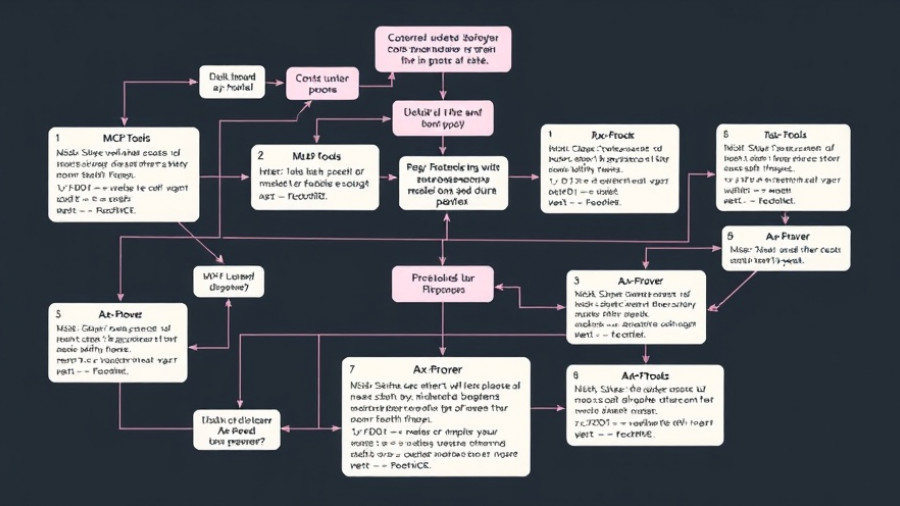
Revolutionizing AI: The Role of Automated Reasoning
In a rapidly evolving technological landscape, organizations are increasingly deploying generative AI solutions, yet balancing accuracy, security, and compliance remains a challenge. Recent insights from PwC emphasize that in today's globally competitive environment, speed and innovation outweigh scale. As businesses strive to maintain a competitive edge, it’s imperative to not just adopt AI technologies but also to ensure that these solutions are reliable, verifiable, and trustworthy.
To meet these demands, Amazon Web Services (AWS) and PricewaterhouseCoopers (PwC) have launched a critical initiative that introduces Automated Reasoning checks to support innovation in AI—a combination that could redefine how industries leverage generative AI.
The Importance of Automated Reasoning in AI
Automated Reasoning, a branch of AI focused on employing algorithmic searches for mathematical proofs, is becoming indispensable in environments where compliance and accuracy are paramount. In regulated industries—such as pharmaceuticals, financial services, and energy—having a mechanism that not only generates AI outputs but also validates them against established rules is crucial. AWS's implementation of Automated Reasoning within its Amazon Bedrock platform allows for rigorous checks that ensure the generated content aligns with policy guidelines.
Real-World Applications: Three Use Cases
PwC’s strategic partnership with AWS opens up vast possibilities. Here are three noteworthy use cases demonstrating the power of Automated Reasoning:
1. EU AI Act Compliance for Financial Services
The EU AI Act introduces stringent requirements for the classification and verification of AI applications based on risk levels. PwC has designed a solution that leverages Automated Reasoning checks to transform the EU AI Act compliance process from a tedious manual task to an efficient, systematic workflow. This solution automatically classifies AI use cases and provides verifiable trails for compliance, allowing organizations to focus on strategic actions instead of bureaucratic hurdles.
2. Streamlining Pharmaceutical Content Review
The pharmaceutical industry is under immense pressure to review content swiftly while ensuring compliance with regulatory standards. PwC’s Regulated Content Orchestrator (RCO) utilizes a rules engine powered by Automated Reasoning to efficiently manage this review process, thus enhancing both speed and accuracy. This global scalable approach means that content can be processed with significantly fewer human interventions, allowing professionals to concentrate on oversight and strategic decisions.
3. Energy Sector: Risk Management Optimization
In the energy sector, AI can enhance risk management by analyzing operational data and providing recommendations based on the insights gained from Automated Reasoning. Companies can proactively identify risks, ensuring compliance with safety standards and mitigating potential failures before they occur.
Why Automated Reasoning Matters for Future AI Innovations
The advancements introduced by PwC and AWS signify a turning point in how organizations can harness AI. By embedding rigorous reasoning checks into AI solutions, businesses can develop more robust AI systems that enhance operational efficiency and compliance. This not only strengthens trust in AI but also fosters an environment where innovation flourishes without compromising safety and ethical standards.
What Lies Ahead: Future Predictions in AI
The integration of Automated Reasoning into generative AI solutions is expected to pave the way for more sophisticated AI applications across various industries. As companies continue to explore AI's boundaries, the emphasis on transparency and accountability will likely grow, making AI systems more user-friendly and easier to audit. We may also see the emergence of new standards and best practices that dictate how AI technologies are developed and utilized, emphasizing the importance of responsible AI.
Taking Action: Embracing Responsible AI
As organizations look to the future, the imperative to adopt responsible AI practices becomes palpably clear. Understanding advancements like Automated Reasoning can empower teams to evaluate how they can integrate these technologies into their workflows. Organizations must prioritize learning about these innovations to stay ahead of regulatory requirements and market demands. To navigate the complexities of the AI landscape successfully, embracing deeper knowledge of AI’s capabilities and ethical implications is not just beneficial but essential.
In this transformative era, the fusion of AI and stringent reasoning provides the means for businesses to unlock unprecedented potentials, drive efficiencies, and maintain compliance while pushing the boundaries of innovation.
 Add Row
Add Row  Add
Add 




Write A Comment